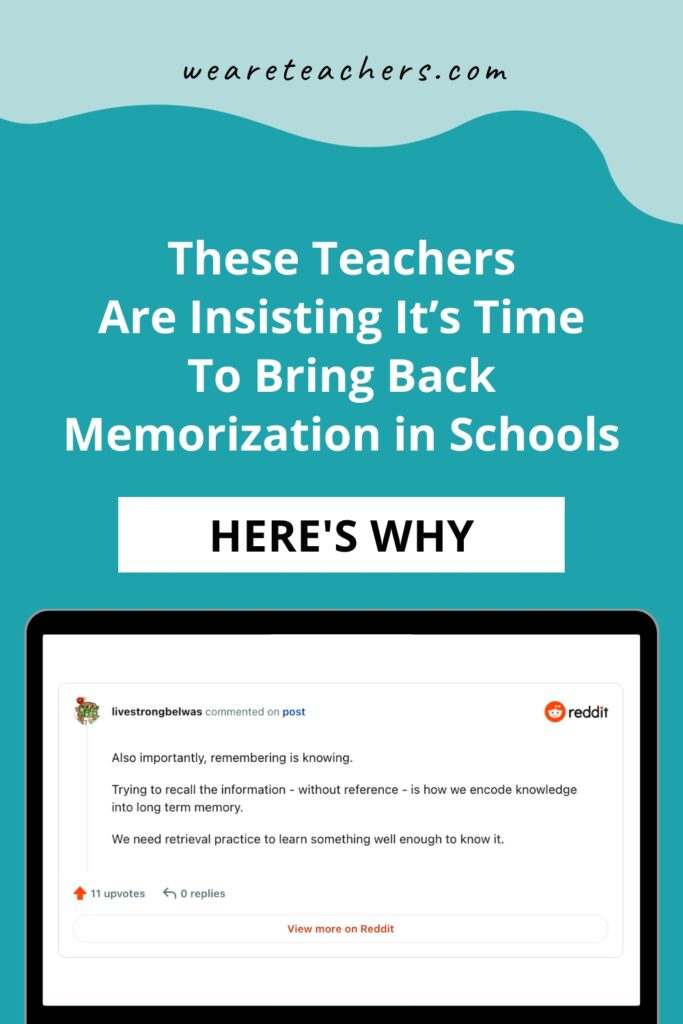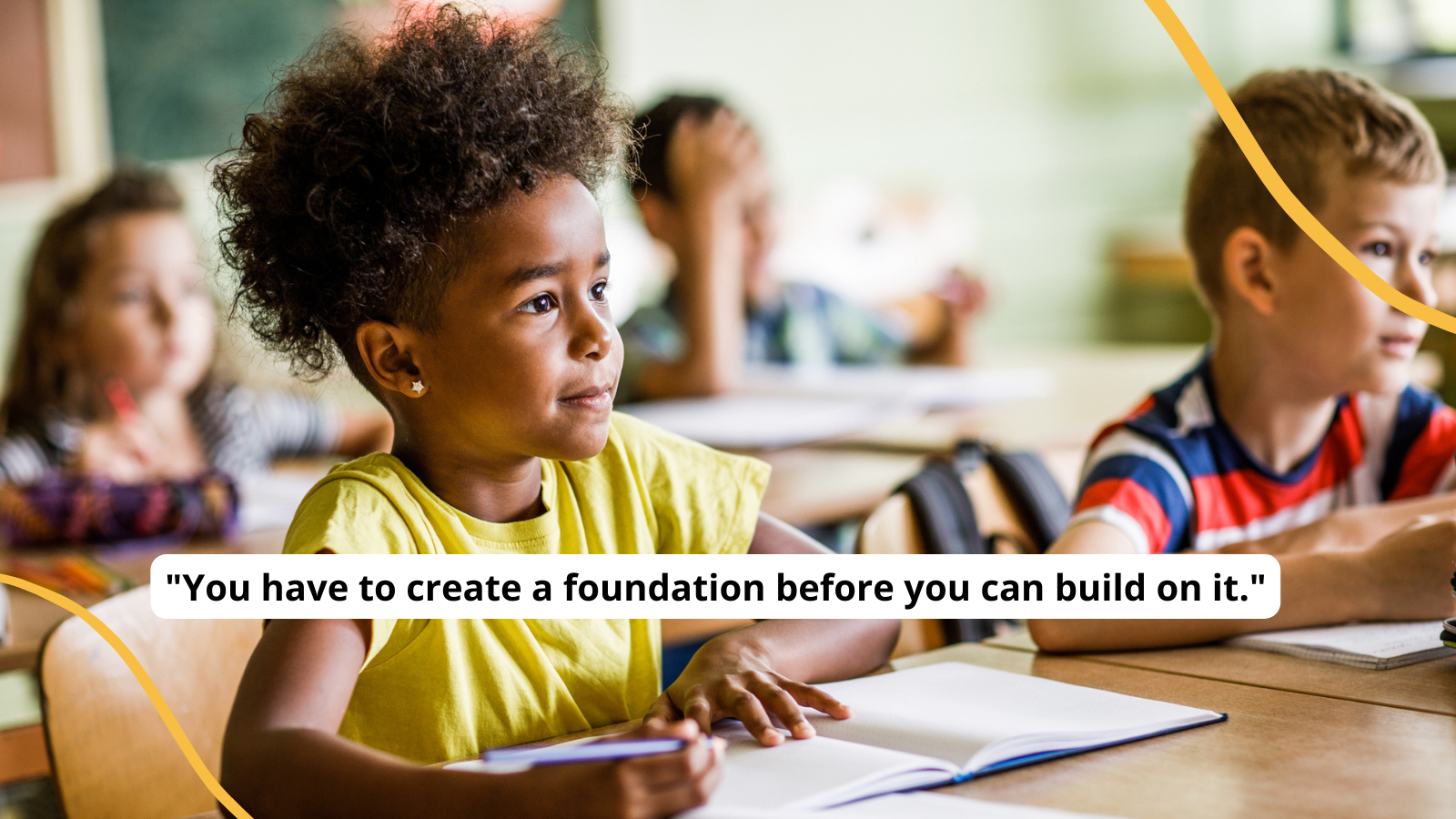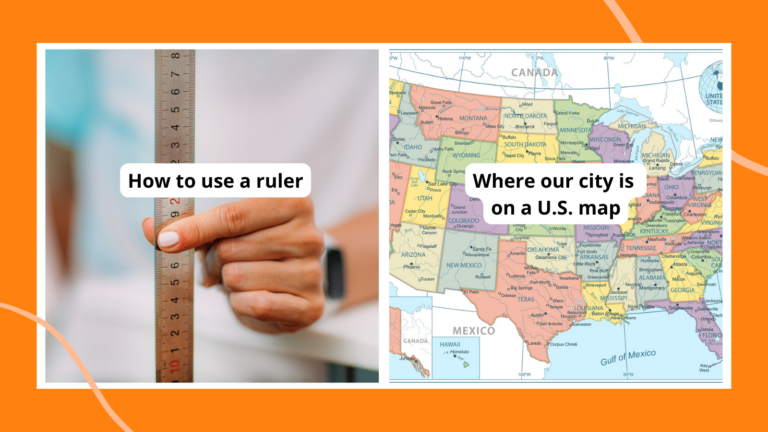As a former math teacher, I didn’t say the word “memorize” a whole lot. We were using formulas that students had to be able to conceptualize to be able to use, and memorizing the formula alone wouldn’t have done them any good. I didn’t fight the times table battle much at all because the math teachers before me had fought the good fight already! So when I stumbled upon this Reddit teacher’s opinion to bring back memorization, I was intrigued.
“When I was in K-12 (1997-2010), the tests I took would make a current teacher baffled: history tests made us remember dates, math required us to write out the times tables over and over and over again, religion class (private school) led us to write prayers on a piece of paper from memory, science made us remember parts of an atom, and geography required us to be given a world map and write in the name of every country. Vocabulary. Flashcards. Homework. Reading for that reading test the next day. Etc. It was all ‘cram that information in your head.’ Don’t worry about why it is useful, just remember it.
“I am NOT saying that schools should go back to 100% content knowledge, and I am NOT saying we shouldn’t require students to develop skills. I am also not saying that we should go back to ‘education in a vacuum,’ in that we just teach students stuff because it is a part of the curriculum, and they will probably never use it. …
“But when you don’t have the fundamental knowledge, you cannot build skills around it. I cannot teach a kid Calculus efficiently when he has to put in 2 * 7 in his calculator. We are kidding ourselves right now. This WILL NOT and HAS NOT been working.”
One of those last sentences stuck with me.
When you don’t have the fundamental knowledge, you cannot build skills around it.
This teacher makes a good point. Another math teacher argues that memorizing isolated facts can help support the best part of learning. Fellow grading reformer Rick Wormeli highlights the issue with the internet providing facts at our fingertips because only half of low-income children have access to the internet after school hours. What happens to students when we’ve made them rely on the internet for rudimentary facts, but it’s not readily available at home?
The rest of these Reddit teachers agree that some level of memorization is suitable for students, and here’s why:
It evens the playing field.
Comment
byu/Waltgrace83 from discussion
inTeachers
Memorizing doesn’t mean they don’t understand the why or the how.
Comment
byu/Waltgrace83 from discussion
inTeachers
“Writing is remembering.”
Comment
byu/Waltgrace83 from discussion
inTeachers
“Remembering is knowing.”
Comment
byu/Waltgrace83 from discussion
inTeachers
Don’t we have to memorize certain syllable and consonant sounds to be able to read and speak?
Comment
byu/Waltgrace83 from discussion
inTeachers
If students don’t have a basis for their knowledge, they won’t be able to make connections
Comment
byu/Waltgrace83 from discussion
inTeachers
If we relegate learning to “just the things that can’t be looked up,” what will be left?
Comment
byu/Waltgrace83 from discussion
inTeachers
You won’t have time to Google everything as a medical doctor.
Comment
byu/Waltgrace83 from discussion
inTeachers
Don’t students need the first level of Bloom’s taxonomy to reach the top levels?
Comment
byu/Waltgrace83 from discussion
inTeachers
Students can’t perform upper levels of math quickly without a solid foundation.
Comment
byu/Waltgrace83 from discussion
inTeachers
Students must use building blocks for a foundation of upper-level knowledge.
Comment
byu/Waltgrace83 from discussion
inTeachers
So it seems like these educators are all insisting on the same thing. The call to reintegrate memorization into elementary education comes from understanding the importance of foundational knowledge. Students need the basics before learning more deeply and building on their skill levels. While contemporary educational companies may emphasize problem-solving and using resources, this does not negate the value of memorization. Memorization can serve as a bridge between essential information and higher-order cognitive skills.
Relying solely on online resources for basic facts could disadvantage students who lack consistent internet access. Recalling building blocks of information from memory can empower students regardless of technological circumstances. Administrators that encourage schools to move away from memorizing building blocks of knowledge could be contributing to future inequities faced by economically disadvantaged students.
It looks like this debate isn’t about choosing between memorization and skill development but instead finding the balance between the two—understanding we need a nuanced approach, and that both can be good for students (two things can be true at once!). A well-rounded education is a firm grasp of not only critical thinking but also a firm grasp of core knowledge.
What do you think? Is it time for schools to bring back memorizing simple information? Let us know in the comments.
Looking for more articles like this? Be sure to subscribe to our newsletters!

We Are Teachers

